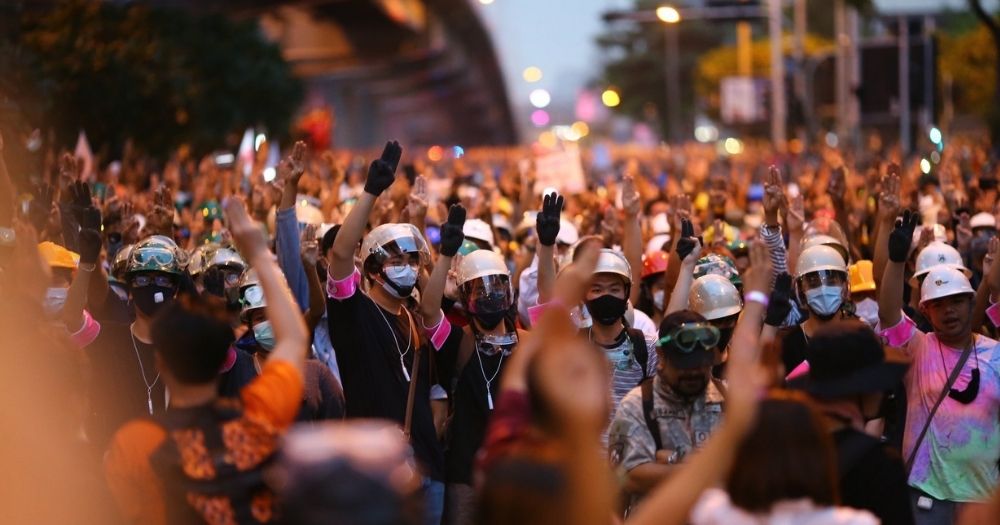COMMENTARY: The 2020 Thailand Protests have been ongoing for over three months. The pro-democracy protests, largely youth-led, is the largest movement in the country since the 2014 military coup.
A young Thai in her 20s contributes a piece to Mothership sharing why she, along with thousands of others, takes to the streets to make a point despite disapproval from segments of society.
I'm a Thai citizen in my 20s. I've been working for a few years while studying for my master's degree.
I started attending the protests in October 2020.
I don't think the protests will succeed, but I still participate in them.
The protests started with three demands -- dissolution of the House, ending intimidation of the people and drafting a new constitution.
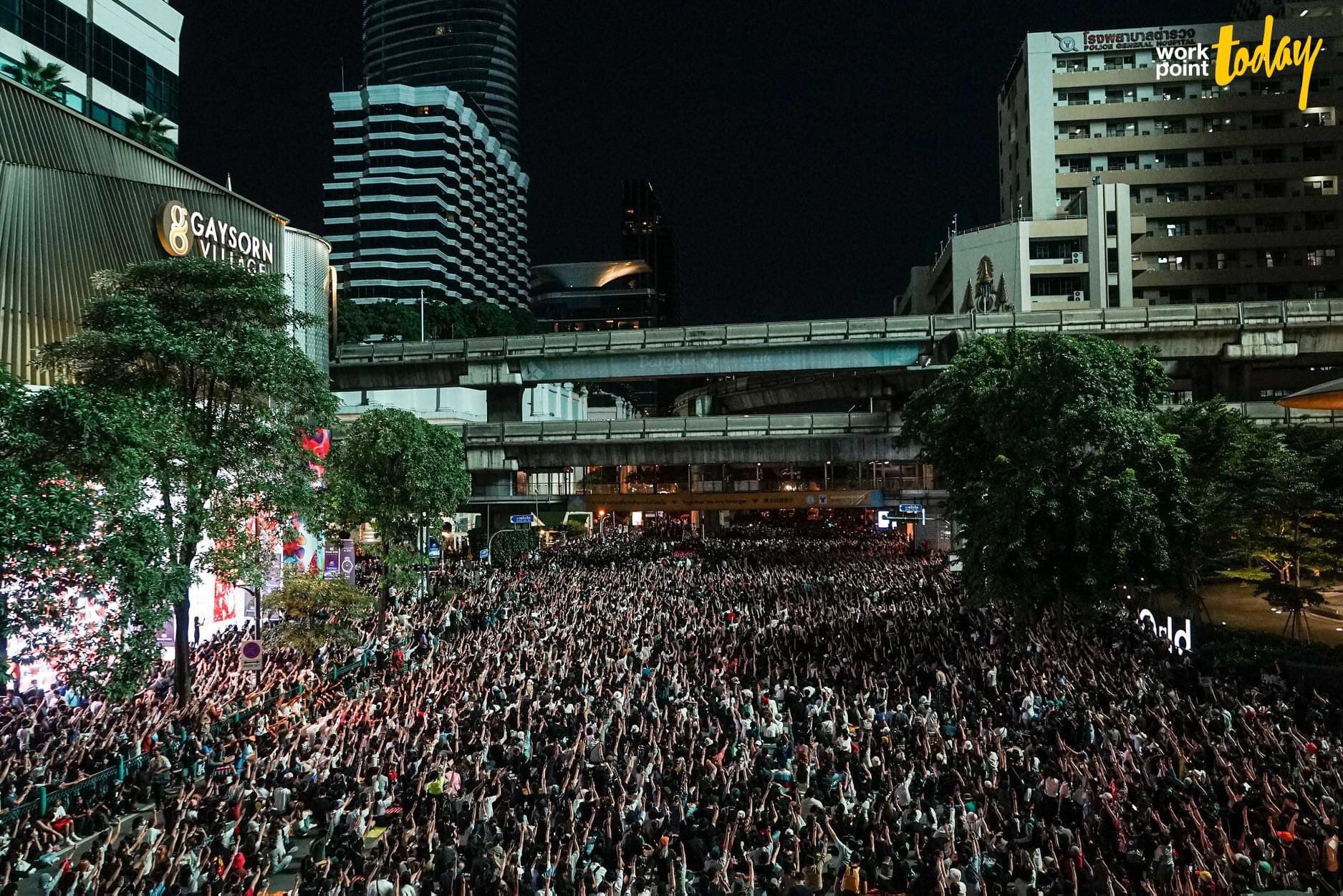 @MTBB9397BB/Twitter
@MTBB9397BB/Twitter
I personally agree with the demands, and I also felt that the election last term which saw Prayuth Chan-ocha elected as prime minister seemed slightly fishy in some aspects.
I also don't have any love for the monarchy -- even before the ascension of the 10th king, it's always somewhat baffling when you realise how wealthy the royal family is.
It's no secret to Thais that the royal family is wealthy -- magazine rankings love talking about that -- but to understand exactly how much money they have is beyond comprehension.
But despite all of my personal agreements with the motives of the protests, government or monarchy-related, I don't think the protests are likely to succeed.
This comes with several reasons, one of the main ones being that the protesters moved too quickly with the protests against the monarchy.
Despite many not liking the 10th king as a person, Thais in general still respect the monarchy as an institution.
By leading in with protests against the monarchy, they've inevitably alienated a fair bit of the country.
Though, when you actually attend a protest, especially the bigger ones, you can't help but get caught up in the fervour.
Participating in the protests
I went to the tail end of the Pathum Wan, the protests at Wongwian Yai and Samyan Mitrtown, and the protest at Asoke.
The protest at Pathum Wan was the first I planned to go to.
At the protest, I saw a lone man, who was standing in the middle of the road, got knocked off his feet when a jet stream flew straight to the back of his head.
The police had brought out the water cannons and riot shields. A video clip of the incident went viral online.
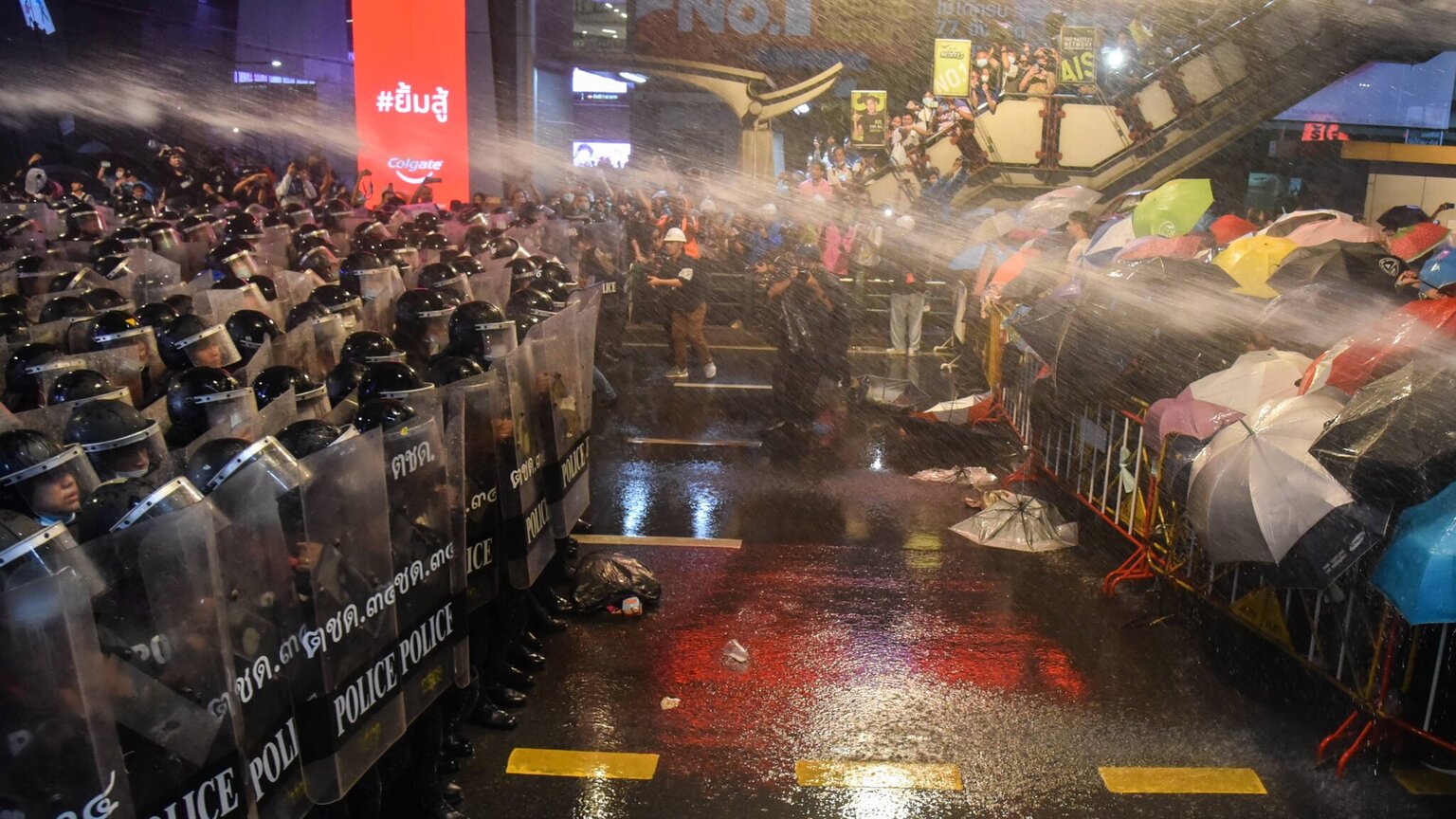 Photo via Getty Images
Photo via Getty Images
News channels with anti-protest leanings would go on to claim that everything done by the police was sanctioned under the law.
Kindness within the protests
However, that was also the day where I first witnessed kindness among the protesters.
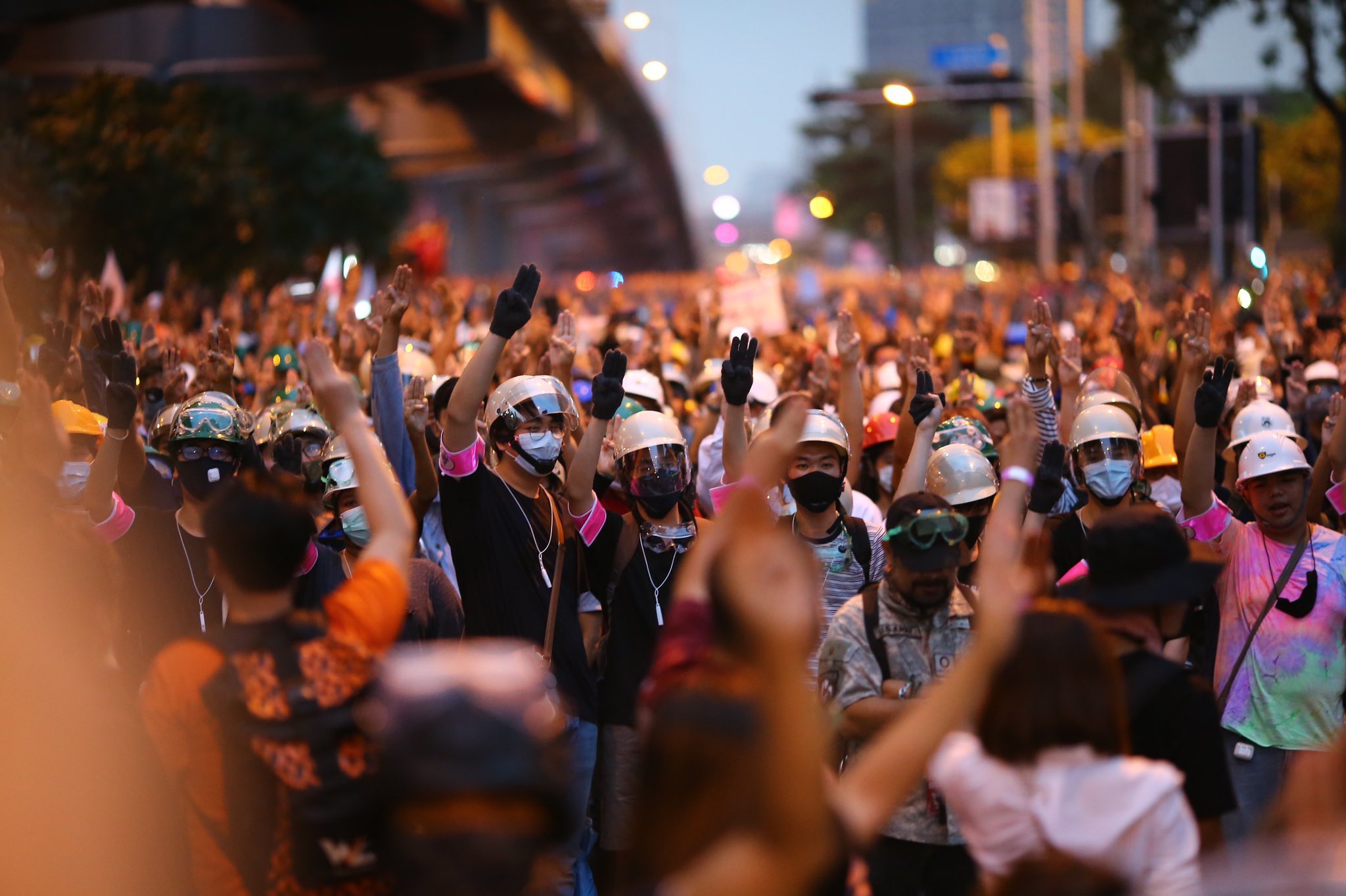 @PhilosophyNook/Twitter
@PhilosophyNook/Twitter
People urged others to go home, to fight another day. A security guard told us the initial route I planned to take was blocked -- I told the others who were sharing the same path as me that there was a pedestrian bridge over the river that the police were unlikely to block.
A cafe left its doors open, allowing us to cut through the premises instead of doubling back to another alley in order to get to that bridge.
Along the way, residents of the neighbourhood told us to keep on fighting as we passed.
The second protest I attended was at Wongwian Yai, the largest that I've been to.
I met a myriad number of people. An auntie, a protest veteran: she had bought six verandah-sized umbrellas and handed those umbrellas out to the student protestors, and bought raincoats and gloves for our little group, strangers she had met just minutes ago.
These were for protection against the chemicals in the water cannons, just in case they came by.
I met others, like me, who came alone and told nobody because their parents did not approve; it felt comforting to see that I was not alone in my situation.
Solidarity among the crowd
Standing in that crowd was like being swept up in a tidal wave.
There was a person who started shouting a slogan. But while some people might sneer at it or shy away, here in the crowd, it echoed.
It felt safe to repeat the protest slogan, and I felt almost invulnerable with so many others who are of the same mind.
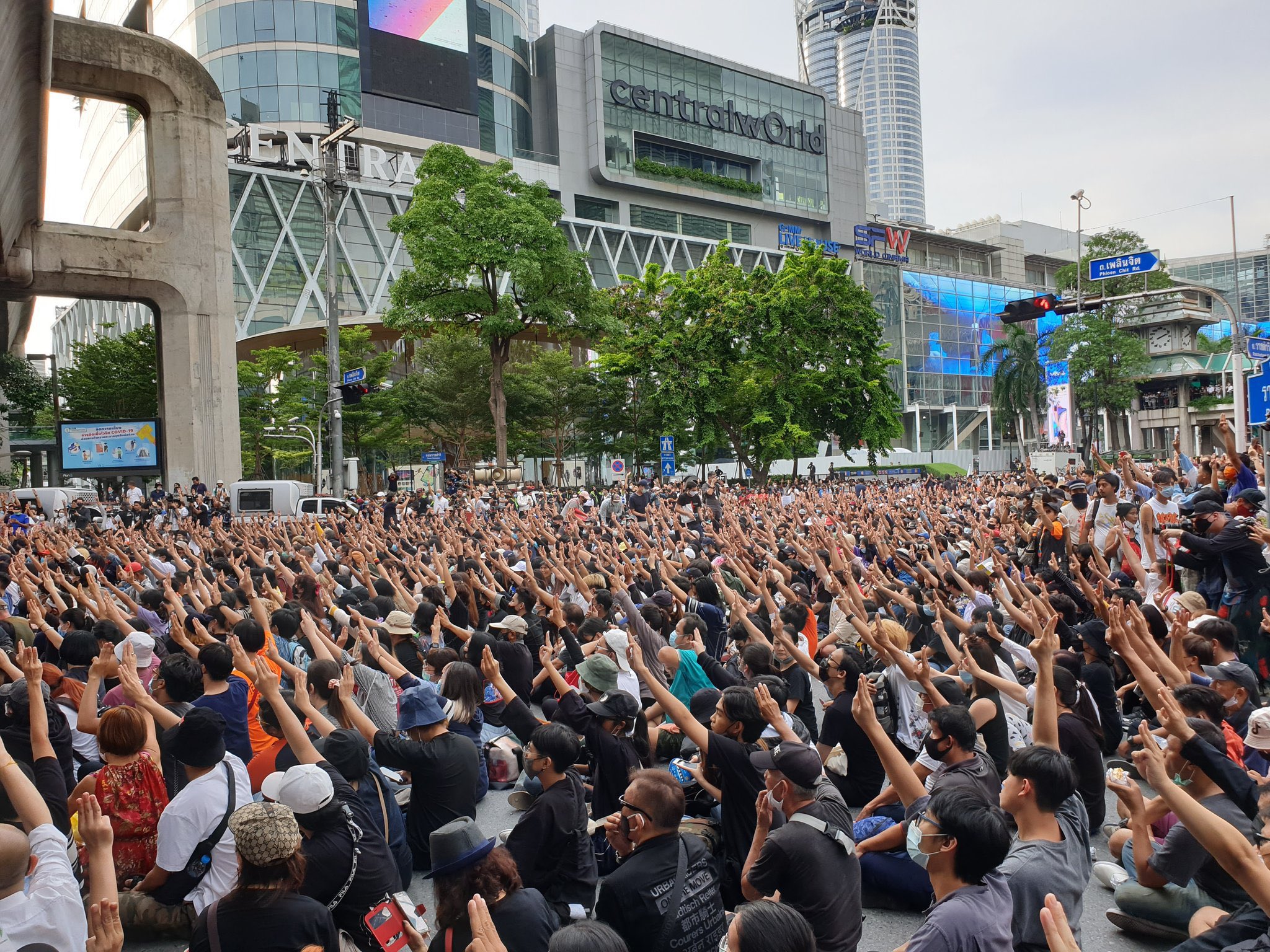 Photo via @bunnywolfmoots/Twitter
Photo via @bunnywolfmoots/Twitter
While at the back of my mind, I was always calculating escape routes and contingencies, as well as dreading the disapproval from my parents.
But in that crowd, there was no room for thought, only bright optimism for success.
It’s invigorating, and it makes you think, even hope, that perhaps it is possible to see the demands being fulfilled -- that with so many people, they can’t possibly ignore all of us.
The protests at Samyan Mitrtown and Asoke were smaller and more subdued, with more people choosing to sit down and listen to those making speeches.
But the kindness I’ve seen has always remained. People in the front passed water bottles, candy and waterproof pouches down, so you could keep your phone in -- all for free. If you didn’t need them, you would just pass the items on to others.
We passed instructions on to others virtually too.
I received a photo on AirDrop that contained directions to the nearest university -- the "safe zone" in case of a crackdown. I passed it on to others who turned on their AirDrop.
The one constant in all these protests was that we were always looking at our phones. We kept alternating between various web pages on the Internet, and apps, such as Facebook, Twitter, and most recently Telegram.
We do this to look for news, for the progress of the protests at the other locations, and to be on the lookout for the first signs of any approaching water cannons.
At Asoke, there was a period of time when it was nearly impossible to load anything online, not even our messages on LINE. We were using all the Thai telecom networks -- AIS, True, or DTAC -- but nothing would load.
It felt like we were blind, wrapped in darkness, as we could not tell what might be coming for us next.
I still keep the items I received in my bag -- the raincoat, the waterproof pouch, the gloves and even the single candy.
I keep them as a reminder and as preparation. Ready at all times for the next protest that I can join.
A sense of duty
As idealistic as this may sound, I participated in the protests as I felt that it was my duty as a young Thai.
I can’t deny that the Internet has raised general political awareness among the population, and encouraged an increase in free speech and thought, which definitely contributed to the success of the current protests.
But it has also allowed for a certain brand of activism -- that is, slacktivism.
While it is good that more people support the cause, all the tweets and Facebook posts and likes and reblogs in the world do not have the same impact as a huge mass of people who share one voice.
That physical presence is important as it offers infallible proof to the people who dismiss us as "trolls" or "children who do not know any better", that we are not simply "a minority" since there are so many of us.
As one of the arrested protestors said, any benefit from these protests, if there is, would benefit all of us. It seems only right that I contribute to the progress of the country any way that I can, especially because I can.
Parents' disapproval
However, by participating in the protests, I risk being cut off by my family and parents, who have forbidden me from even remotely associating myself with the protests.
My mother does not support the protests. She grew up in an era that revered the monarchy, and perhaps also by virtue of our economic position, she sees that there is nothing wrong with the imbalance of wealth in the country.
The monarchs, to her, are the rightful landlords -- we are simply tenants living under their care.
For the people outside of the protests, my family included, most of them seem to view the protests as little more than a nuisance.
"What do they hope to achieve?" they ask. "Their demands don’t even make sense."
"These children should work before they go around protesting things they don’t understand."
Or, "Why bother protesting when nothing good ever comes out of it?"
They know that I am far more liberal than they are, so they won’t chastise me for that -- but they have also explicitly forbidden me to attend any protests, and to post anything on social media concerning my (positive) opinion of them.
It’s a restriction borne out of love, out of worry, but one that places limits on myself nonetheless.
That same restriction binds me whenever I hear their opinions on the protests. This same restriction also binds me when I muster up the courage to let my opinions be known.
There is a type of dismissal that pervades not only my family but also Thai society, that no matter how old you are, you are in the position of someone "younger", with perpetually lesser knowledge, and that you are too naive to understand the workings of the world.
I have seen my relatives post on social media that said if anyone died at the protests, they got what was coming.
And I have always wondered if they would still think the same if I was the one who died.
I have a sinking feeling, or rather, a certainty, that they will.
[The Thai author of this piece has requested anonymity for fear of reprisal.]
We deliver more stories to you on LinkedIn
Top image via @philosophynook/Twitter
If you like what you read, follow us on Facebook, Instagram, Twitter and Telegram to get the latest updates.
